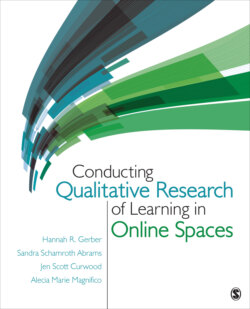Читать книгу Conducting Qualitative Research of Learning in Online Spaces - Hannah R. Gerber - Страница 16
На сайте Литреса книга снята с продажи.
Choosing Among Qualitative Traditions
ОглавлениеQualitative research is an established form of inquiry that explores people’s experiences in their natural settings (Creswell, 1998). These traditions can be used in concert, as a researcher sees the need emerge, as a means to appropriately attend to the research question and the examined online space. This is not suggesting that existing traditions be abandoned or misappropriated. Rather, harkening back to Christine Hine’s (2013) discussion of researching online spaces, studying online meaning making can be challenging, and looking first to established traditions can help researchers appropriate the right methods for their studies. This book examines the core features of qualitative inquiry found in case study, ethnography, grounded theory, and phenomenology. However, this list of approaches is not exhaustive.
As Sharan B. Merriam (2009) aptly noted, other methodology scholars, such as Michael Quinn Patton (2002), John W. Creswell (2007), Norman K. Denzin and Yvonna S. Lincoln (2005), and Renata Tesch (1990), have called attention to a variety of approaches. Their classifications, which include a range of five to forty-five approaches, thereby underscore that there is “no consensus” in categorizing qualitative inquiry (Merriam, 2009, p. 21). We do not intend to offer or recategorize traditions. Instead, this book provides options—namely, options for researchers to take an agentive stance and extend existing approaches beyond the boundaries of their existing constructs. Following the discussion of the four aforementioned qualitative traditions, this book addresses research paradigms that inform research approaches.
